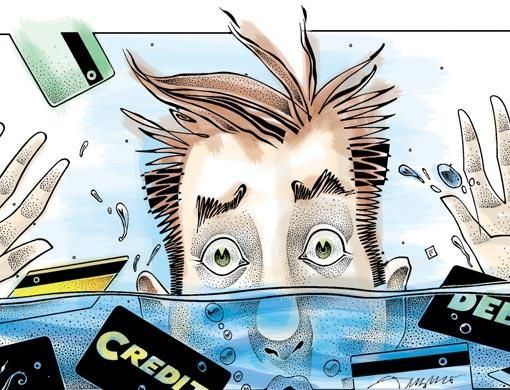When you're swimming in a sea of debt, you're constantly looking for a lifeline. This is the time to keep a cool head and make sure that whatever you latch on to will buoy you to safety and not tie you down with dead weight.
Just be careful who heeds your SOS. A loan may help get you by, but you'll want to borrow money at the best rates, according to terms that suit your needs - and steer clear of bad deals as well as those that look too good to be true.
When you're in financial trouble, predators smell opportunity. "You need money, you feel desperate, you're scared and there are lots of people who know that and try to take advantage," says New York Law School professor and debt expert Karen Gross.
According to Gross, there are two lines to keep in mind: The smaller the print, the bigger the hint. This means make sure you understand the fine print, because if it's in small print, it's probably anti-consumer.
If it's on the back, it gives you a whack. This ditty reminds us that the stuff that stores and lenders want you to see is front and centre and looks pretty good in big, bold print. The back contains terms and conditions that you really want to pay attention to. Before you take on new debt, it's a good idea to take a look at your credit report and make any corrections. Gross says this is of particular importance for people already in debt. Will it buoy or sink you?
Balance transfer tips: If you go for a credit card offer that promises a low rate for balance transfers, don't use it for new purchases.
Creditors will apply your payments to the amount with the lowest interest rate first; meanwhile interest for new purchases will accrue at the higher rate.
Michael McAuliffe, president of Family Credit Counselling Service, explains: "If I charged a $3,000 balance transfer, then went and charged another $500, I cannot pay the $500 off - and that's going to be charged at the higher interest rate. So if I send them a $300 minimum payment, they're going to apply that payment toward lowest interest first. Then I've got $2,700 at the 1.9 per cent, but now I've also got $500 at the 9.9 or 18.9 or 21.9 per cent that I can't pay off until I pay off that teaser rate."
If you really want to use the transfer to full advantage, continue to play lower rate transfer offers against higher rate debt until you get all your debt at the right price, advises consumer credit expert Gerri Detweiler.
"For example, you may be able to consolidate $2,000 of your high interest rate credit card debt. I can almost guarantee you as soon as you pay them off, they'll send you something in the mail saying 'come back - here's a balance transfer offer for 6.99 per cent,'" says Detweiler.
"Then you take that and you play it against one of your other high interest rate credit cards and work on getting the interest down that way."
Home equity pitfalls
Too many people have borrowed against their homes only to find themselves in a dicey predicament because their home values have since dropped. They owe more than the property is worth.
Banks are taking it on the chin because of increased defaults. Assuming you have plenty of home equity to draw upon, you can still make money mistakes that will later haunt you.
McAuliffe says the most common problem is that people who draw on their equity to pay off high-interest debt then begin running up credit card debt all over again. "It's about behaviour modification, and the only way to pay down debt is with income and by cutting your spending," he says.
Keep it in the family: Your friend or family member is not likely to report late payments to the credit bureaus. They're also not going to like being taken advantage of. If you need money and can keep current on payments, this could be a good quid-pro-quo situation.
Scott Bilker, creator of debtsmart.com and author of Talk Your Way Out of Debt, advises borrowers to value the relationship above financial gain. "Borrowing money from friends and family is very risky, but you can also make it worth their while. I had three conditions when I borrowed money from my father-in-law.
Bilker's three conditions for borrowing from family:
- I paid him better interest than he could get at the bank.
- I could pay off the loan as quickly as I wanted.
- Most importantly, if he wanted the balance at any time, I would write him a cheque and pay it back in full.
"Family and friends must be your top priority. Pay them back first, never late." McAuliffe has seen too many cases where a family member has bailed out a debtor only to see them run the debt back up again. "Anything like that takes away from the individual responsibility," he says. "If it's easy, we might not learn our lesson."
Raiding retirement fund
This is almost always a bad idea, but if you're facing serious financial difficulties - for example, bankruptcy - it's nice to have options. Borrowing from your pension fund may be the least disruptive way to access money earmarked for retirement, but it will almost certainly impact the amount you will ultimately have at retirement.
It's true that you pay yourself back with interest, and you benefit from that interest. But the money that you've withdrawn is not compounding or working for you. In addition, many people stop making new contributions to their retirement plans while repaying the loan. However, it's almost never a splendid idea to raid retirement funds.
Watch out for sharks
Be careful not to fall prey to quick and easy money loaned at usurious rates. These include cash advances on credit cards, payday loans and refund anticipation loans.
All offer convenience - and charge high fees. "If you get into one of those options and you haven't changed the way you think about money, you haven't changed your spending habits, you risk getting into a worse situation than you were in before," says Harrine Freeman, author of How to Get Out of Debt.
"Payday loans are just wrong all the way around," says Freeman, "because they charge so much in interest. Most people end up owing more money because of all the fees."
Cash advances also involve fees, plus the interest rate is higher and accrues for a longer period than lower-interest-rate obligations.
These legal borrowing options usually offer terms reminiscent of those from loan sharks. While you won't be visited by thugs who threaten to break your limbs, your finances will definitely be hurting if you use them.












